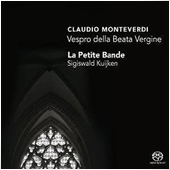
DEFINITIVE RECORDINGS

Claudio Monteverdi lived during a crucial period of profound change in music (1567-1643). The shift from late Renaissance to early Baroque, when composers were becoming more concerned with the
meaning and feeling behind the words they set to music. Henceforth vocal music was supposed to derive the rules of its development more from the words than from the cantus firmus. The number of
excellent madrigal composers at that time was large, and Monteverdi was one of the best at capturing the impetus and momentum of this new free and passionate art.
The work in question here, the Vespers, was apparently not conceived as a whole, but was constructed out of various songs and madrigals written at different times, that came together to
form one of the most ambitious sacred works of that period. In his scholarly liner notes, Sigiswald Kuijken suggests that the performance of this sort of music would vary strongly at that time,
but that in his 1610 edition, Monteverdi gave many instructions regarding vocal and instrumental setting. In this brilliant performance, Kuijken has chosen to follow these instructions to the letter.
Therefore, the vocal parts are always in a solo setting, one per part, each of the ten singers having an individual role, which facilitates more pronounced expression. Consistent with Monteverdi's guidelines,
many fragments are accompanied only by the organ. Other segments of the work have only the indication "con stromenti" (with instruments), without precise indications about which. This requires the performer to
make his own choices, which is in keeping with the spirit of the times.
The instruments used in this recording were custom built based on early 17th century specifications, and the string players have learned to hold their instruments and bows according to practices from that period.
The results of all this brings to us a performance of pure and intimate beauty. After all, these are Vespers, to be performed during evening services, and not a Great Mass meant to shake the building's foundation.
Some other recordings have tried to make this music seem "grander" than it is, with negative results. None of the singers involved in this project have operatic voices, which suits this Renaissance masterpiece very well.
Each voice has a unique and individual quality to it, particularly the high tenors, but the overall blend when they sing as a choir is magnificent. The instrumental players are equally perfect. The precision and accuracy
of the wind instruments in particular is uncanny, a great example of which is to be heard in the "Sonata sopra Sancta Maria" at the beginning of the second disc. And when all the vocalists and instrumentalists come together
on the last chord of a piece, they produce harmony so clean and pure, but yet rich and full, that will make you disbelieve what you are hearing from such a small group of performers.
All in all, a definitive interpretation of this Monteverdi work of art, very well prepared by Sigiswald Kuijken, and captured in perfect sound by the people at Challenge Classics. A new recording from early 2009 that really
freshens up this 400 year old masterpiece.
Jean-Yves Duperron